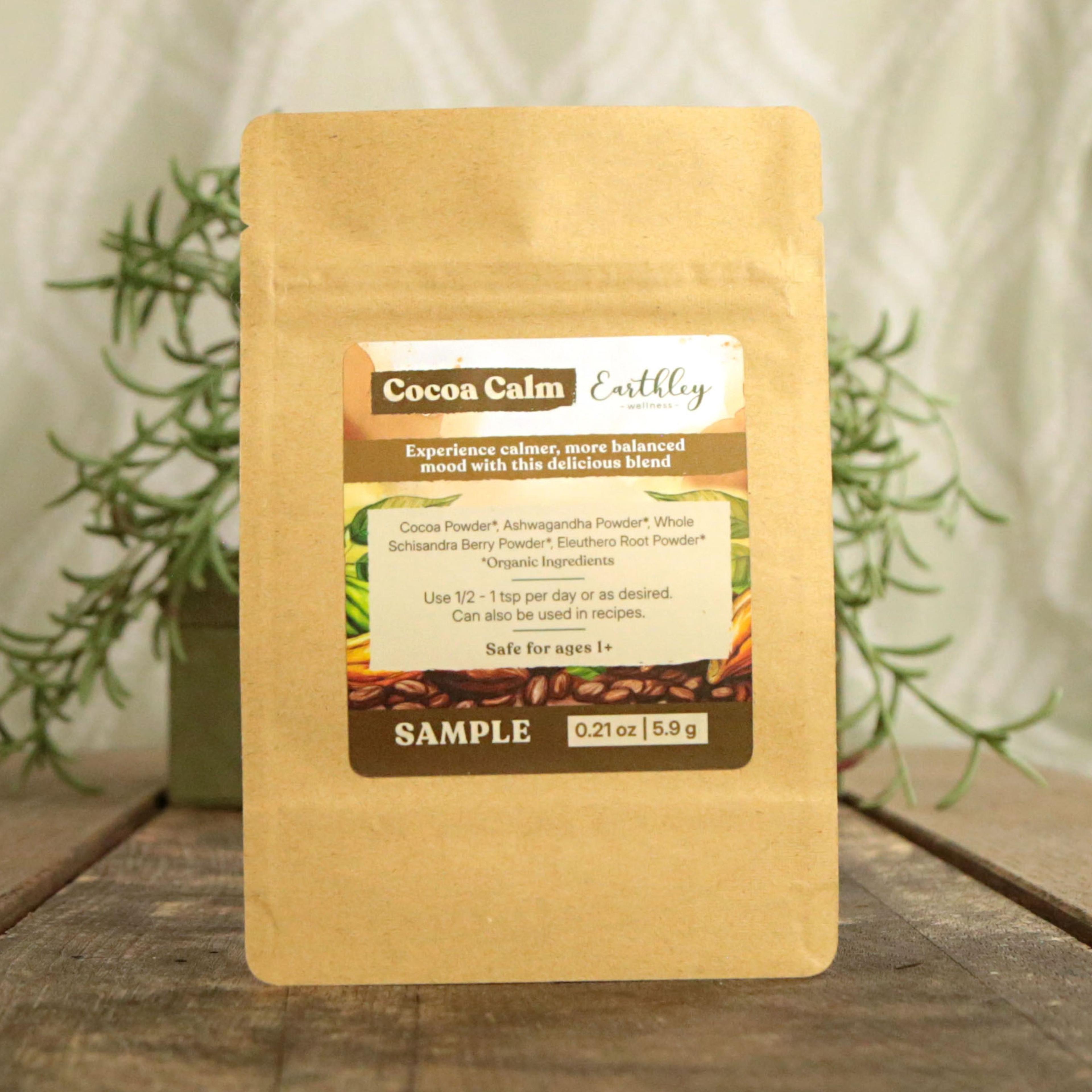How to Support Healthy Cortisol Levels Naturally

Cortisol often gets labeled as the “bad guy,” but really, it’s not the enemy. It’s one of those hormones that keeps life moving... helping us wake up, focus, handle challenges, and even manage inflammation. We need cortisol to function well. The problem happens when our levels stay too high or too low for too long.
For many of us, modern life makes that balance tricky. The constant rushing, the notifications, the coffee refills, skipped meals, and late nights... they all tell our bodies, we’re not safe to rest yet. Over time, that message keeps cortisol levels running in overdrive. And when that happens, we start to feel it: wired but tired, moody, foggy, or completely drained.
The good news? Supporting healthy cortisol levels doesn’t require a total lifestyle overhaul. It’s about steady, sustainable habits that bring our bodies back into rhythm. Let’s look at what really helps... through food, lifestyle, and gentle herbal support.
Food: The Foundation of Balance
What we eat, when we eat, and how consistently we nourish ourselves all send signals to the body. If we eat in a way that keeps blood sugar stable and nutrients plentiful, cortisol can stay steady, too.
Choose whole, real foods.
Our bodies thrive on foods that are close to their natural form... fruits, vegetables, whole grains, healthy fats, legumes, and quality proteins. These nutrient-dense choices give our systems what they need to keep metabolism steady and stress responses calm.
Focus on magnesium-rich foods.
Magnesium plays a powerful role in calming the nervous system and regulating cortisol. When it’s low, we may notice more tension, poor sleep, or higher stress reactivity. Some favorites include dark leafy greens, nuts, seeds, avocados, and even a bit of dark chocolate... yes, chocolate can be part of the plan.
Prioritize healthy fats.
Omega-3 fatty acids, found in salmon, sardines, flax, chia, and walnuts help keep inflammation and stress hormones in check. They also nourish the brain and support mood balance.
Build balanced plates.
Each meal should include a mix of protein, fiber, and healthy fat. This combination keeps blood sugar stable and prevents those quick spikes and crashes that make cortisol surge. Think eggs with avocado in the morning, or chicken and roasted sweet potatoes for dinner.
Be mindful of stimulants and refined foods.
Caffeine, sugar, and processed foods all add stress to the body’s system. They can make cortisol swing higher or crash lower than it should. Instead of cutting everything cold turkey, we can focus on crowding in more nutrient-rich foods and staying hydrated throughout the day.
Eat at consistent times.
Our bodies like rhythm. Skipping meals, eating late at night, or grazing all day can throw off cortisol’s natural rise-and-fall pattern. Regular, balanced meals, especially a nourishing breakfast help set the tone for the day.
Don’t forget hydration and gut health.
Even mild dehydration can increase cortisol. Water, mineral-rich broths, and herbal teas all help. A healthy gut supports stress resilience too, so adding in probiotic-rich foods like yogurt, kefir, kimchi or sauerkraut can make a difference.
When we eat in a way that supports steady energy and deep nourishment, our bodies can relax. Food is the foundation that teaches our systems it’s safe to calm down again.
Lifestyle & Routines: Building Steady Rhythms
If food is the foundation and lifestyle is where we build rhythm... the daily habits that help our bodies know what to expect and when to rest create the lifestyle.
Prioritize quality sleep.
Cortisol naturally rises in the morning and falls at night, but this rhythm depends on consistent rest. Waking and going to bed around the same times each day helps retrain that cycle. For most adults, 7–9 hours of sleep is ideal. Getting sunlight in the morning also helps reset the circadian rhythm and promotes natural cortisol balance.
Create gentle morning and evening routines.
Morning: Step outside for a few minutes of daylight, stretch, and eat breakfast within an hour of waking. This supports a healthy morning cortisol peak.
Evening: Dim the lights, unplug from screens, sip calming tea, or take a warm bath. These signals help cortisol drop so the body can rest and repair overnight.
Move, but not to exhaustion.
Exercise is one of the best ways to balance cortisol, but too much intensity can backfire. Gentle, consistent movement helps far more than pushing your body to extremes. Walking, swimming, yoga, Pilates, or even dancing in the kitchen all count. The goal isn’t punishment... it’s rhythm and release.
Practice daily stress reduction.
It’s not always about removing stress (life happens) but rather helping the body come back down from it. Breathing exercises, stretching, journaling, music, or simply pausing for stillness all shift the nervous system into “rest and digest” mode.
Set boundaries and honor rest.
In a culture that rewards busyness, slowing down can feel uncomfortable. But cortisol thrives on predictability... it needs us to step out of constant alert mode. Saying no, scheduling breaks, and doing one thing at a time all make a noticeable difference.
Foster connection and play.
Laughter, conversation, time in nature, and cuddles with loved ones or pets all lower cortisol naturally. Our bodies are wired for connection, and when we feel safe, our stress hormones relax too.
Healthy cortisol levels come from rhythm... not perfection. Every walk, every bedtime routine, every meal eaten without rushing is a quiet signal to the body: you’re safe to rest now.
Herbs, Adaptogens, & Thoughtful Support
Once we’ve laid a strong foundation with food and lifestyle, herbs and adaptogens can gently support balance from the inside out. These aren’t quick fixes, they’re tools that help our bodies adapt to daily stress and recover from long-term strain.
Adaptogens work by supporting the body’s internal stress response system, they don’t force cortisol up or down, but help the body recalibrate naturally.
Here are a few trusted herbal allies and product options that many families love:
Earthley Calm & Clarity Herbal Extract
A soothing blend that supports mood balance, calm focus, and emotional steadiness. It helps the body handle daily stress so cortisol doesn’t stay in overdrive.
Earthley Adaptogenic Immunity
Although created for immune support, this formula includes adaptogenic herbs like ashwagandha and reishi... both known for helping regulate stress and restore healthy cortisol rhythms.
Earthley Greens Powder
A rich source of vitamins, minerals, and phytonutrients. This simple addition fills nutrient gaps that might otherwise leave the body in a constant state of depletion or stress.
Earthley Anxiety Relief Herbal Extract
For those seasons when stress feels heavier, this herbal blend supports calm and helps the nervous system reset more easily.
Beyond specific products, we can also look to individual nutrients and herbs:
Ashwagandha helps calm excessive cortisol and supports better sleep.
Rhodiola improves mental focus and reduces fatigue from chronic stress.
Magnesium helps the body relax and supports adrenal health.
L-theanine (from green tea) promotes calm alertness without drowsiness.
Omega-3s support both brain and hormonal balance.
When our systems are gently nourished and supported, herbs help us move from survival mode to resilience.
Bringing It All Together
Cortisol isn’t the villain... it’s one of our body’s most important messengers. It helps us get out of bed, think clearly, and respond to challenges. But when that rhythm gets disrupted, when it stays high through the night or crashes during the day... we start to notice it in every part of life: poor sleep, mid-afternoon slumps, sugar cravings, irritability, or a sense of being constantly “on edge.”
The beautiful truth is that the body wants to heal. It’s built for balance. When we nourish it consistently with steady meals, calming rituals, gentle movement, and mindful herbal support, we help cortisol find its natural rhythm again.
This isn’t about eliminating stress... it’s about teaching our systems how to recover from it.
Small shifts matter.
- A walk outside after dinner.
- Turning screens off 30 minutes earlier
- Eating a balanced breakfast instead of skipping it.
- Swap the afternoon coffee for an adaptogenic tea.
Check out these products!

Promotes balanced mood and focused attention

For daily stress and immune support

Provides natural energy and balanced nutrition

To promote calm mood

For healthy sleep and magnesium (NEW! Moonlight Bloom scent)


